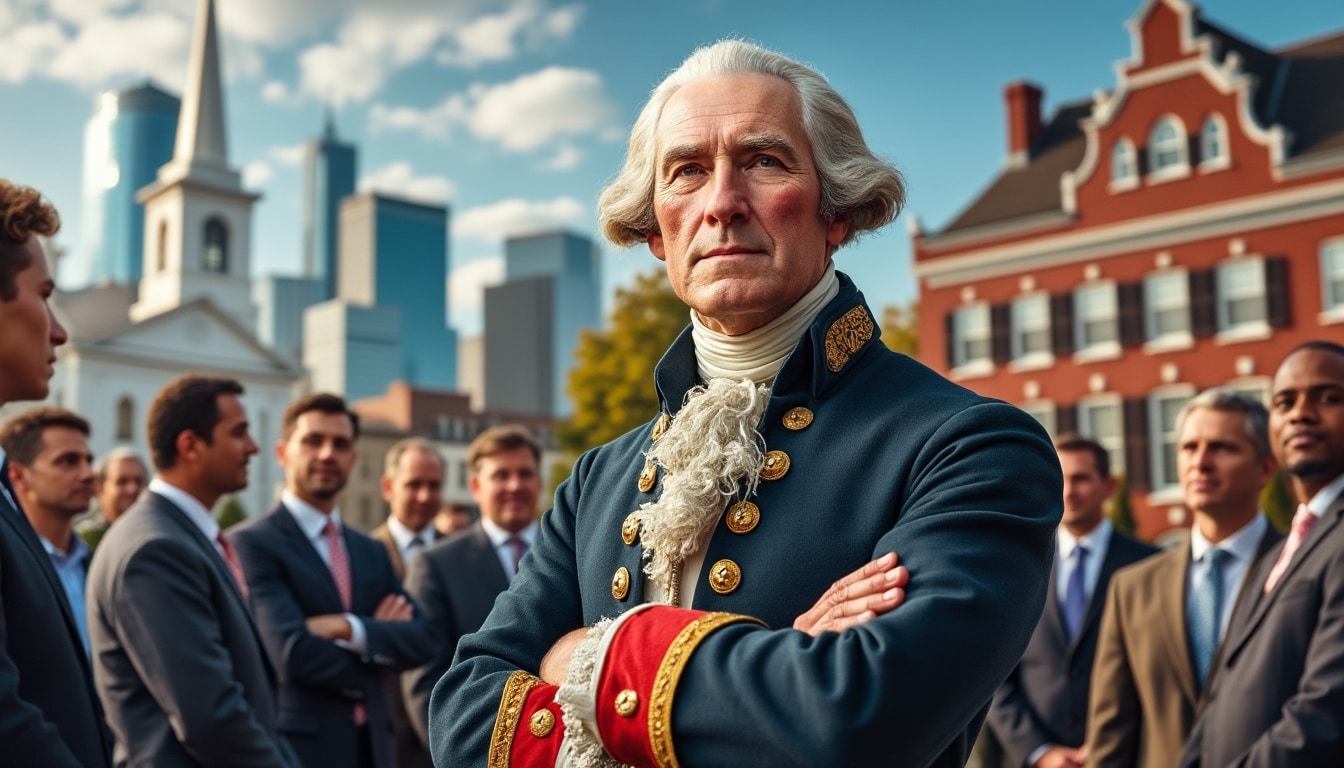“`html
Welcome to the world of authentic leadership. I am Véronique, passionate about developing the leaders of tomorrow. Together, let’s explore the keys to sustainable influence.
In crucial moments of history, certain leaders have embodied timeless qualities that still resonate today. George Washington is one of those emblems of intelligent leadership. His clear vision, unwavering integrity, and exemplary humility offer valuable lessons for modern leaders. In a time marked by uncertainty and constant change, the principles he established remain relevant for anyone seeking to inspire and guide with authenticity. As an Executive Coach, I draw inspiration from such examples to help my clients achieve excellence. Together, we can build a leadership based on solid values and continuous growth. Let’s discover how to apply these historical lessons to your professional journey.
George Washington: A Timeless Model of Authentic Leadership
At a pivotal moment in American history, George Washington did not simply lead; he embodied the traits we now call intelligent leadership: integrity, vision, and humility. In an era of disruption and distrust, his legacy offers timeless lessons for modern leaders seeking to build influence based on character and lasting impact.
Discipline is the soul of an army. It makes small armies formidable, brings success to the weak, and respect to all. – George Washington. Washington’s discipline, calmness, and resilience inspired the troops and the people he commanded, leading to decisive victories such as the Battle of Trenton and the Siege of Yorktown, which ultimately led to the independence of the United States.
As the Commander-in-Chief of the Continental Army during the American Revolutionary War, Washington laid the foundations for the American presidency, earning the title “Father of His Country” and establishing many invaluable precedents. His ability to lead with resilience, a calm demeanor, and a long-term vision is a source of inspiration for today’s leaders.
Washington introduced the concept of peaceful transition of power, an essential practice for modern democracy. His decision to step down from the presidency after two terms established a crucial safeguard against abuse of power. His exemplary leadership remains a historical reference for those seeking to develop positive influence and authentic leadership.
The qualities of Washington, such as his integrity, vision, humility, and adaptability, are essential pillars for any aspiring leader. By understanding and applying these principles, leaders can not only strengthen their own leadership but also inspire their teams to reach their full potential.
As an Executive Coach, I strive to convey these historical lessons to my clients, helping them develop self-awareness, inner strength, and the ability to build consensus within their teams. By cultivating authenticity and personal growth, each leader can leave a lasting, positive mark in their field.
Applying the Wisdom of George Washington
Given that Washington’s leadership aligns in many ways with the principles of intelligent leadership, applying his wisdom is a relatively straightforward exercise for effective and healthy leadership. Here’s how leaders can practice some of Washington’s lessons:
- Demonstrate a strong commitment to organizational values and work ethic.
- Focus on values-based decision making and ethical interactions in all aspects of business.
- Foster an inclusive work environment that values and rewards coaching.
- Create organizational cultures that embrace change and reward adaptability.
- Develop an inspiring long-term strategic vision.
- Manage failures positively, treating setbacks as learning opportunities and thereby strengthening resilience.
Leaders can also apply Washington’s wisdom by committing to a path of authentic leadership and personal growth. It is only through authenticity that leaders can inspire their teams and enhance their leadership effectiveness.
Conclusion
George Washington’s leadership, founded on character, courage, humility, and a profound sense of duty, remains essential for today’s leaders. His legacy reminds us that authentic leadership is not about power but about service, vision, and moral clarity. If you are ready to elevate your impact by developing the same inner strength that defined Washington, I invite you to take the next step. Schedule a meeting with us to explore how intelligent leadership coaching can help you unlock your full potential and lead with lasting influence.
Frequently Asked Questions
1. What can modern business leaders learn from George Washington’s leadership?
George Washington’s leadership teaches modern leaders the power of self-awareness, ethical decision making, and consensus building. He was able to unite diverse groups around a shared vision, embodying calm authority and emotional maturity. His legacy offers essential lessons for today’s managers seeking to increase their influence, confidence, and impact through coaching and personal growth.
2. How does intelligent leadership coaching build on Washington’s legacy?
Our coaching for managers helps develop self-awareness, inner strength, and the ability to build consensus, hallmarks of Washington’s leadership. Through personalized coaching, we equip leaders to align their values with their behaviors, communicate with clarity, and navigate complexity with vision and integrity, just as Washington did in times of crisis.
3. Why is authenticity important in leadership today?
Authentic leaders lead with self-awareness and communicate openly, thereby creating trust and fostering strong cultures. Authenticity strengthens consensus building and inspires teams to engage in shared goals. Coaching for managers helps cultivate authenticity by aligning personal values with leadership actions, thus enhancing engagement and long-term performance.

“`html
the synergy of modern leadership and tradition
Hello, my name is Véronique, I am 36 years old and I am an Executive Coach. Today, let’s explore together how the authentic model of George Washington can inspire modern leadership. By merging lessons from the past with contemporary practices, we can create a powerful synergy to lead with integrity and effectiveness.
how does George Washington define authentic leadership?
George Washington embodies authentic leadership through his integrity, vision, and humility. As the first president of the United States, he demonstrated a unique ability to inspire and guide his team during crucial moments. His decision to step down from power after two terms set an essential precedent for democracy, illustrating his commitment to the common good rather than personal power.
Washington understood that authenticity in leadership translates into actions that are consistent with one’s values. His ability to be transparent and honest reinforced the trust of his troops and the burgeoning nation. This authenticity is a valuable lesson for modern leaders, who must also balance transparency and vision to build strong and resilient teams.
what are the leadership qualities of George Washington applicable today?
The qualities of George Washington, such as resilience, long-term vision, and the ability to learn from failures are particularly relevant in the current context. Washington showed remarkable resilience in overcoming the challenges of the Revolutionary War and guiding the country toward independence. This same resilience is crucial for modern leaders facing constantly evolving environments.
Additionally, his strategic vision allowed him to make informed decisions that had a lasting impact. For example, the neurosciences-par-neuro-leadership-consulting-un-retour-sur-investissement-de-37x-pour-les-dirigeants/”>Proclamation of Neutrality demonstrated his aptitude for anticipating geopolitical and economic implications, a crucial skill for today’s leaders.
how does Washington’s leadership inspire contemporary leaders?
The leadership of Washington inspires through its balance of power and humility. As Commander-in-Chief of the Continental Army, he motivated his troops despite limited resources, illustrating the importance of intrinsic motivation. His actions at Valley Forge, where he shared the rigors of winter with his soldiers, demonstrate a leadership by example that resonates today.
Contemporary leaders can leverage this approach by cultivating a corporate culture where leadership by example and solidarity are valued. For example, the launch of the leadership coaching program for the Maritime Force draws inspiration from these principles to develop resilient and engaged leaders.
what lessons from Washington can be applied to modern leadership?
The lessons drawn from George Washington are numerous and applicable to modern leadership. One of the most essential is ethical decision making. Washington always made decisions based on moral principles, even when they were difficult, such as his refusal to accept the title of king.
Another key lesson is the importance of clear communication. Washington understood that to unite and lead effectively, he needed to communicate his vision and expectations transparently. Today, leaders must also embrace open communication to build cohesive and motivated teams. To delve deeper into this aspect, check out our conferences on intrinsic and extrinsic motivation in leadership.
how to integrate Washington’s principles into corporate culture?
Integrating the principles of George Washington into corporate culture requires a thoughtful and structural approach. Start by defining clear values that reflect integrity, resilience, and strategic vision. Encourage employees to adopt these values through training and development programs, such as our industry portrait with Kevin Kivi, an expert in executive coaching and leadership at True North.
Next, promote leadership by example. Leaders must embody the values they wish to see in the company. For example, by adopting practices of neuro-leadership, companies can improve decision-making and team management. Discover our neuroscience coaching method to maximize the effectiveness of your leadership.
what modern tools complement Washington’s model?
Modern leadership tools can perfectly complement the authentic model of Washington. Advanced communication technologies allow for increased transparency and improved collaboration among teams. For instance, project management platforms and real-time feedback tools can help maintain a shared vision and quickly adapt to changes.
Moreover, neuroscience-based approaches, such as Neuro Leadership Consulting, offer strategies to improve decision-making and stress management, thereby enhancing the resilience and effectiveness of modern leaders. By combining these tools with Washington’s principles, leaders can create dynamic and ethical work environments.
how does personal development strengthen authentic leadership?
Personal development is essential for strengthening authentic leadership, just as George Washington continually sought to improve himself and learn from his experiences. As an executive coach, I emphasize the importance of self-awareness and reflection to build a solid foundation of leadership. Modern leaders can benefit from personalized coaching sessions to identify their strengths and weaknesses and develop strategies for their continuous growth.
Innovative initiatives, such as leadership and sales training programs for Caribbean leaders, illustrate how personal development can be effectively integrated into various cultural and organizational contexts. By investing in personal development, leaders can not only improve their skills but also authentically inspire and motivate their teams.
how to measure the impact of authentic leadership in an organization?
Measuring the impact of authentic leadership requires clear indicators and appropriate tools. Key metrics might include employee satisfaction, retention rates, and overall team performance. Regular surveys and structured feedback can provide valuable data on the organizational climate and leadership effectiveness.
Furthermore, using performance tracking technologies and data analysis allows for assessing the alignment between organizational goals and leader actions. For example, implementing a leadership coaching program like the one described in our leadership coaching program for the Maritime Force can provide quantifiable insights into leadership skill enhancement and its impact on organizational performance.
Finally, case studies and testimonials can provide qualitative perspectives on how authentic leadership positively influences organizational culture and financial outcomes. By combining these approaches, organizations can obtain a holistic view of the impact of their leadership and identify opportunities for continuous improvement.












